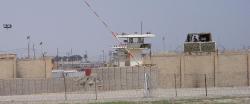 |
 |
Time: al-Qaeda’s Massive Baghdad Jailbreak

Read the full article at Time
The Middle East has presented Barack Obama with many nasty surprises. But Iraq has not been among them. Since the last U.S. combat troops left 19 months ago, the site of America’s long Bush-era nightmare has held together relatively — repeat: relatively — well. It may not be Disneyland, but Iraq has so far avoided descending back into the savage state of anarchy many people predicted.
Alas, it may be that Iraq is living on borrowed time. One reason why was illustrated on Monday, when al-Qaeda fighters staged a brazen attack on two Iraq prisons, using car bombs, mortars and rocket-propelled grenades to free hundreds of inmates — including many of their brothers in arms.
“The number of escaped inmates has reached 500, most of them were convicted senior members of al-Qaeda and had received death sentences,” Hakim al-Zamili, a member of the Iraqi parliament, told Reuters.
The attacks — one of which targeted Baghdad’s notorious Abu Ghraib prison — illustrate the growing threat to Iraq’s stability posed by al-Qaeda in Iraq, known to U.S. officials as AQI. The group’s fighters, which may number between 2,000 and 3,000, aim to stoke the Sunni-Shi‘ite rivalry that tore Iraq apart in the mid-2000s and has been inflamed by the sectarian civil war in neighboring Syria.
“They’ve got the wind at their backs from the Syrian rebellion,” where Sunni rebels are fighting an Alawite Shi‘ite regime, says Kenneth Katzman, a Congressional Research Service analyst who recently completed a detailed report on Iraq. “Their goal is to destabilize and bring down the Maliki government, and they think igniting sectarian conflict might accomplish that.”
The new concern comes at a time when some close observers of Iraq — including two former senior government officials who focused on Iraq and who recently spoke with TIME — say they’re cautiously optimistic that Iraq’s political actors can work together. Recent tensions between Iraqi Kurds and Arabs have cooled of late, for instance. And one of the officials argued that recent provincial-election defeats for Nouri al-Maliki’s State of Law Coalition may have chastened a Prime Minister who has ruled with a dangerously heavy hand, infuriating Iraq’s Sunnis by favoring his fellow Shi‘ites.
The growing promise of oil wealth may also be providing an incentive for dueling factions to cooperate, this official says. Iraq plans to boost oil production by nearly one-third over the next year — a boon for the U.S. because Iraq’s oil production counters Iranian crude blocked by sanctions, thereby limiting global price hikes.
But the hopeful talk will die fast if al-Qaeda militants can ignite a vicious new cycle of Sunni-vs.-Shi‘ite violence. “They have been hitting Shia civilians,” says Jessica Lewis, a former army intelligence officer in Iraq now with the Institute for the Study of War. “We’re seeing Shi‘ite militias forming” in response.
Lewis calls Monday’s prison attacks sadly predictable. “Al-Qaeda has been speaking about prison breaks and the release of prisoners as a principal objective since before the American withdrawal,” she says. Abu Ghraib is “the mother prison … where the core of the al-Qaeda network” was held, she adds.
With violence rising, some Iraqi leaders who bade America good riddance in late 2011 are now asking Washington for help. “The Iraqis sort of kicked us out,” says Katzman. “A lot of the [security] programs we hoped to continue, they basically discontinued. Now the Iraqis are getting nervous because of AQI, and they want us back again.”
Could it happen? Last month, Joint Chiefs of Staff Chairman Martin Dempsey did suggest that the U.S. consider sending “teams of trainers” to help Iraq fend off what he called a “re-emerging” al-Qaeda threat.
But while it’s possible the U.S. will offer help at the margins, Iraqis shouldn’t expect an American cavalry. Leaving Iraq is one of Barack Obama’s proudest accomplishments, and the President clearly has no desire to undo it — possibly even at the cost of seeing Iraq slip back into chaos.
© 2013 Time Inc.